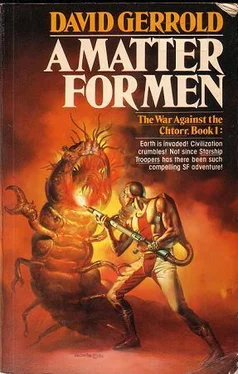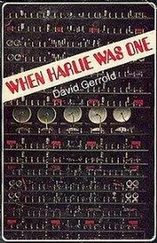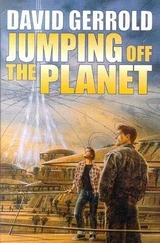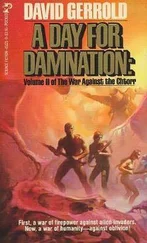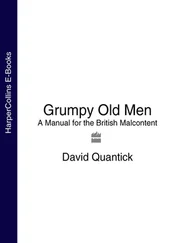David Gerrold - A Matter for Men
Здесь есть возможность читать онлайн «David Gerrold - A Matter for Men» весь текст электронной книги совершенно бесплатно (целиком полную версию без сокращений). В некоторых случаях можно слушать аудио, скачать через торрент в формате fb2 и присутствует краткое содержание. Год выпуска: 1983, Жанр: Боевая фантастика, на английском языке. Описание произведения, (предисловие) а так же отзывы посетителей доступны на портале библиотеки ЛибКат.
- Название:A Matter for Men
- Автор:
- Жанр:
- Год:1983
- ISBN:нет данных
- Рейтинг книги:4 / 5. Голосов: 1
-
Избранное:Добавить в избранное
- Отзывы:
-
Ваша оценка:
- 80
- 1
- 2
- 3
- 4
- 5
A Matter for Men: краткое содержание, описание и аннотация
Предлагаем к чтению аннотацию, описание, краткое содержание или предисловие (зависит от того, что написал сам автор книги «A Matter for Men»). Если вы не нашли необходимую информацию о книге — напишите в комментариях, мы постараемся отыскать её.
A Matter for Men — читать онлайн бесплатно полную книгу (весь текст) целиком
Ниже представлен текст книги, разбитый по страницам. Система сохранения места последней прочитанной страницы, позволяет с удобством читать онлайн бесплатно книгу «A Matter for Men», без необходимости каждый раз заново искать на чём Вы остановились. Поставьте закладку, и сможете в любой момент перейти на страницу, на которой закончили чтение.
Интервал:
Закладка:
"Sounds good to me-except what if it isn't all your money? Remember, we've been consuming nearly one-half the world's resources for most of a century. What if it's their money too?"
"But it wasn't their money-it was their resources. And they sold them to us on a free market."
"A free market which they claim we manipulated to our advantage."
"And they haven't manipulated back?"
"Ah, I didn't say that." Whitlaw was trying to keep a careful neutrality. He held up a hand. "I don't want to repeat the whole argument-that's not what we're going for today-but are you beginning to understand the nature of the disagreement? Do you see the validity of both points of view?"
A general murmur of assent swept the room.
"Now," said Whitlaw, "we've seen how a group of people can make a decision that affects all of them, and that decision can still be unfair. Most of the nations on this planet think the Moscow Treaties were fair. Do you?"
We thought about it. Some of us shook our heads. "Why not?" Whitlaw pointed.
"Our economy was almost destroyed. It took us over a decade to recover."
"Then why did we agree to those treaties?"
"Because the alternative was war-"
"They had us outnumbered-"
"We didn't have a choice-"
"All right, all right-" He held up his hand again. "All of that is all very well and good-but I want you all to consider something else now. Isn't it possible that your perception of the treaties' unfairness is a biased perception, a product of your own subjective points of view?"
"Uh..."
"Well ... "
"Sure, but . . ."
"No." That was Paul Jastrow. Everybody turned to look at him. He said, "It doesn't matter how many people say it's right if it isn't. We just spent a whole session learning that everything a government does is going to be unfair to somebody, but a good government tries to minimize the unfairness."
"Uh huh. . . ." Whitlaw nodded. He was wearing his devil's advocate expression and using a pleasant, noncommittal tone of voice. "But isn't that what the Moscow Treaties were supposed to do? Establish a more equitable distribution of the world's resources?"
"Yes, but they did it wrong-they were confiscatory. And you just demonstrated to us that you can't redress old wrongs that way without creating new wrongs."
Whitlaw picked up his clipboard and made a note. "You're right." He sat down on the edge of his desk and did something very unusual-for Whitlaw. He lowered his voice. He said, "A large part of this course is supposed to be about the Moscow Treaties, so you'll understand why they were necessary. And I think now you understand why many Americans resented them. It felt like we were being unfairly punished for being successful. And it didn't matter to the other nations that all of our studies and data models and simulations showed that most of their starving populations were beyond saving-they still felt that they had to make that commitment to try-"
"But not with our resources-"
"Hush a moment, Paul," said Whitlaw, uncharacteristically polite. "Let me finish this. It didn't matter what we felt. We were outvoted. The other nations of this world were going to see that we cooperated whether we wanted to or not-because data simulations or no, they still had to try to save their starving populations. And yes, it was unfair the way it was done-and that's a large part of what I wanted you to realize-but that was the best solution they could come up with. And yes, it was a punitive one-"
He stopped to catch his breath. He looked a little gray. Janice MacNeil said, "How come it was never explained this way before? I mean, all the news ever said was that it was our own noble sacrifice to help the rest of the world. I never heard before that they were holding a gun to our heads."
"Well, which would you rather believe? That you're doing something because you're being charitable or because you're being forced to? If you were President, which would be easier to sell to the electorate?"
"Oh," she said. "But didn't anybody notice?"
"Sure, lots of people did. And they said so, very loudly-but nobody wanted to believe them. Remember, most people were so relieved at having avoided a nuclear war they were willing to believe that its non-occurrence was proof of the nobility of both sides. They were eager to believe it, rather than that someone had blackmailed someone else under the table. People who complained were called extremists; after all, you don't have to listen to extremists. It's easier than you think to devalue a truth that you don't want to hear. And remember this: any unpopular idea is going to look extreme, so you want to be responsible in how you present it. It is almost always dangerous to be right-and it is certainly dangerous to be right too soon."
"Well-um, does the government know now? I mean, what did we do about it? Or what are we going to do about it?"
Whitlaw said, "The process of making that decision has been going on for almost twenty years now. We are doing it every day. We are surviving. We are continuing-and we're contributing.
"You see, this is the hard part to accept. In retrospect-now that we have had the benefit of twenty years of hindsight-we can see that what was done was perhaps the very best thing to do under the circumstances. If you want to look at it from a nationalistic point of view, those treaties were only temporary setbacks, because they did not cripple us permanently. And furthermore, they made it possible for us to deal with the rest of the world in an atmosphere of reduced hostility because they finally felt they had evened the score.
"Now, you need to know just how we paid our reparations. We only shipped food and farm machinery; instead of cash, we gave them energy satellites and receiving stations. That way, they all had a vested interest in keeping our space program going. We shipped teachers and technicians. We exported ourselves-"
And suddenly, three years later and a thousand miles away, the coin dropped. Whitlaw had never come out and said so, but he had made it pretty clear that we had lost that war. And that we knew we had lost the war-and it seemed as if we had actively cooperated in the process of our own punishment. Or had we? There were a lot of government programs that only made sense in retrospect-like the Teamwork Army, for instance. That was only supposed to be a peacetime solution for massive unemployment-the regimen was exactly like that of the regular army, except they didn't drill with guns; but then, how long does it take to learn how to use a gun? Six weeks?
And the space program-as long as we had mass-drivers on the moon, there wasn't a city on Earth that was safe. We didn't need atom bombs-we could drop asteroids.
And all those shipments of food and farm machinery-that helped our economy more than theirs, because we got to retool our assembly lines to build a new generation of technology.
And all those energy satellites-every nation that accepted one would be dependent on us for its maintenance.
And our export of more than half a million teachers to the underprivileged nations-the next generation of world leaders would be taught with American values.
It made a crazy kind of sense. I could almost imagine the President saying, "What if we only pretended to lose?"
I thought of a lockbox with a false bottom and a suite of rooms on the thirteenth floor. You can't hide anything forever-you can only misdirect the attention of the searcher.
The rest of the world would be looking for evidence of military buildup-and we were hiding it as economic recovery and reparations and civilian solutions to unemployment! And the best part of it was that those things were always exactly what they seemed to be, even when they weren't.
And something else
Even Whitlaw's class had been a sham.
Читать дальшеИнтервал:
Закладка:
Похожие книги на «A Matter for Men»
Представляем Вашему вниманию похожие книги на «A Matter for Men» списком для выбора. Мы отобрали схожую по названию и смыслу литературу в надежде предоставить читателям больше вариантов отыскать новые, интересные, ещё непрочитанные произведения.
Обсуждение, отзывы о книге «A Matter for Men» и просто собственные мнения читателей. Оставьте ваши комментарии, напишите, что Вы думаете о произведении, его смысле или главных героях. Укажите что конкретно понравилось, а что нет, и почему Вы так считаете.
